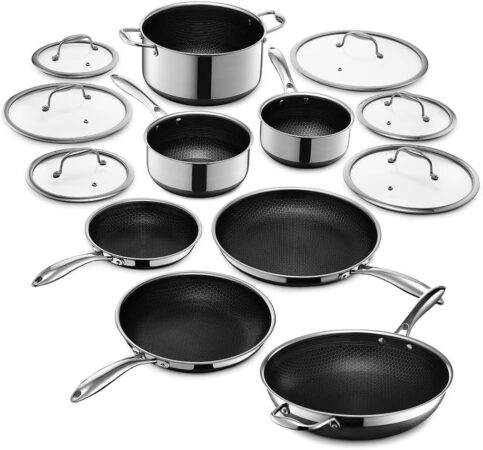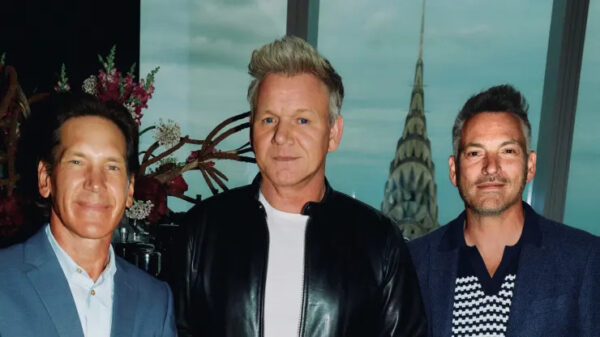In 2023, stories about entrepreneurship success tend to revolve around hot new tech startups. But Danny Winer’s journey to building a cookware business proves that you don’t need to be a tech company to enjoy incredible growth.
Winer’s business Hexclad sells premium, tri-ply, stainless steel cookware that boasts nonstick coating and features a recognizable, laser-etched hexagonal surface. Yet despite humble beginnings, its sales rose 113% over the past year—and its lead global ambassador is none other than celebrity chef Gordon Ramsay.
In retrospect, Winer thinks it’s unsurprising that he ended up in a food-adjacent industry. “My dad’s Jewish, my mom’s Sicilian, and there’s a lot of eating that goes on,” he says.
He’s also not the first person in his family to see professional success in this sphere. Winer’s grandmother became the first female head chef in Buffalo, New York, and she owned various restaurants. But this wasn’t his inspiration for entering the industry—instead, it made him realize how much work being a restaurant owner entails.
Winer spent his 20s pursuing dreams of entering the entertainment industry. The New Jersey native majored in film and theater at New York University, before moving to L.A. to try his hand at acting, writing, directing, and production. He found it demoralizing and switched to bartending.
A turning point came when a friend who worked in cookware offered him the opportunity to attend a tradeshow. Seeing his friend earn good money while only working weekends piqued Winer’s interest. He determined to focus on his entertainment ambitions from Monday to Thursday while attending trade shows every weekend.
That’s not quite how things panned out.
“I got really good at selling, and I enjoyed this space, and I like talking to people about food,” Winer says. “And eventually, I just got a job with the company.” The work suited him so well that he was promoted to national sales manager and then VP of sales.
Fast-forward to today, and that company is out of business. Meanwhile, Winer leads a thriving cookware company. The difference in these fates may come down to how they reacted to an emerging trend: the power of digital.

A HexClad Cookware set
GOING DIGITAL
Winer says of his former employer: “The model was flawed. People were going to these shows to buy products at the convention center, but they were dying off. The internet was killing it.”
Around 2010, Winer tried to tell the company’s owner about the growing importance of Facebook communities for product sales, but he was dismissed: “He goes, ‘Trust me, kid, this Facebook thing is never going to last.’”
Shortly after, Winer started his own venture, intending to harness the power of digital.
He didn’t want to believe that his employer would really go out of business at this point, but he was ready for a change.
After bouncing ideas around for a while, he and his co-founder, Cole Mecray, pulled the trigger in 2013. Neither of them was wedded to the idea of remaining in the cookware business, but they were both attracted to promoting highly demonstrable products.
Hexclad began to take shape when they encountered a man who invented a process of laser-etching hexagons—the pair wondered if they could use the same designs for cookware. Building on what he’d learned while working in sales, Winer instantly saw potential in the idea: “People always complained about the outsides of their pans getting ugly. So I’m like, what if we put our design on the outside? Can we do that?”
A year and a half of designing products followed, resulting in the iconic combination of laser-etched hexagons. Hexclad completed its first order in the summer of 2016.
Winer and Mecray wanted a retail partnership with Costco so they could put on shows in stores to explain their product, but they were practically laughed out of a few offices. The gatekeepers thought it would be too hard to get the shelf space from legacy brands.
However, the retailer changed its tune when Winer was able to apply something he’d read about Costco’s concerns over its average member being 55 years old. In his next pitch, he told them: “We’re not Grandma’s Cookware. We’re the Millennials’ Cookware. We’re Gen Z’s cookware. That’s our customer base.
In November 2017, Hexclad products started to appear in one Costco store. It was an immediate success, and more stores followed. In fact, the company had to ramp up growth gradually to avoid canceling orders due to production delays.
However, the company hadn’t yet figured out its messaging.

HexClad partners Cole Mecray, Gordon Ramsay and Danny Winer
FINDING THE RIGHT MESSAGING
Hexclad lost money on D2C sales in 2017 and the first half of 2018, but the tide turned as the firm started to figure out its brand positioning.
“We always thought of ourselves as badass cookware,” Winer says. “There’s a badass in every little girl, there’s a badass in every grandma, there’s a badass in every dad—we just need to touch it. And that’s what we made: badass cookware.”
However, the real aha moment came when Hexclad posted a static image on social media with the message: “Who says cookware can’t be sexy?” It got people talking—and while there were some complaints from older people, the overall result was growth.
Once this final puzzle piece was in place, Hexclad’s growth seemed practically unstoppable. Consultants frequently underestimated the brand’s growth potential, as it continued to blow projections out of the water. Eventually, the company decided not to work with consultants at all.
However, the pandemic threw a spanner in the works. Costco temporarily shut down, which meant Hexclad’s sales reps lost their income stream. The company paid them a full-time wage as they waited at home for stores to reopen, hoping things would be back to business as usual eventually.
Costco was shut for the better part of the year, but the break made the team rethink their approach. They had earmarked some of their budget for Costco, but decided to spend everything on paid social and see what happened instead. The result? Hexclad.com made $5 million in sales in a single month.

Gordon Ramsay pictured with a HexClad pan
GORDON RAMSAY ENTERS THE PICTURE
The success was partly due to fortunate timing. In 2020, everyone was suddenly interested in home cooking and shopping amid lockdown. “I think people fell in love with cooking again,” says Winer.
However, Winer showed good business instincts in spotting a unique window of opportunity and trusting the power of social media. The experience certainly proved the predictions of Winer’s former boss wrong—social media was not a passing fad after all.
Then something even more unbelievable happened: The team realized Gordon Ramsey followed Hexclad’s Instagram account.
After sending a message to Ramsey, they had a 20-minute call with the famous chef that turned into an hour-and-a-half discussion. Amazingly, Ramsey offered to put the pans in his restaurants and shows.
The numbers were great before Ramsey, with Hexclad growing its sales by 14 to 15 times between 2017 and 2018 and tripling them from 2018 to 2019. But between 2020 and 2021, things were so good that the company was running out of products and forced to leave money on the table.
Sales are up 113% over the last year, and Ramsay is now on the front page of the brand’s website.
The story of Hexclad teaches the importance of choosing a product you know, staying on top of trends, and enjoying a healthy dose of luck. But Winer’s advice for other entrepreneurs is something simpler. “I would tell people, examine your failures. Your failures teach you much more about yourself than your successes really do. Because very often you’re solely to blame for your failures.”














































